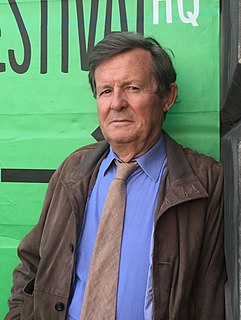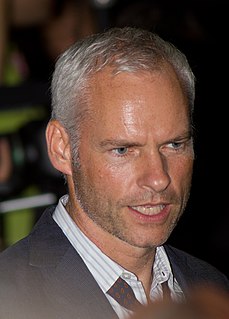
The Berlin Wall was a guarded concrete barrier that physically and ideologically divided Berlin from 1961 to 1989. Construction of the wall was commenced by the German Democratic Republic on 13 August 1961. The Wall cut off West Berlin from surrounding East Germany, including East Berlin. The barrier included guard towers placed along large concrete walls, accompanied by a wide area that contained anti-vehicle trenches, beds of nails and other defenses. The Eastern Bloc portrayed the Wall as protecting its population from fascist elements conspiring to prevent the "will of the people" from building a socialist state in East Germany.

East Germany, officially the German Democratic Republic, was a former country that existed from 1949 to 1990, the period when the eastern portion of Germany was part of the Eastern Bloc during the Cold War. Commonly described as a communist state in English usage, it described itself as a socialist "workers' and peasants' state". It consisted of territory that was administered and occupied by Soviet forces following the end of World War II—the Soviet occupation zone of the Potsdam Agreement, bounded on the east by the Oder–Neisse line. The Soviet zone surrounded West Berlin but did not include it and West Berlin remained outside the jurisdiction of the GDR.

Harvey Forbes Fierstein is an American actor, playwright, singer and voice actor. He is best known for his roles as Frank Hillard in Mrs. Doubtfire and the voice of Yao in Mulan and Mulan II. Fierstein has won the Tony Award for Best Actor in a Play for his own play Torch Song Trilogy and the Tony Award for Best Actor in a Musical for playing Edna Turnblad in Hairspray. He also wrote the book for the musical La Cage aux Folles, for which he won the Tony Award for Best Book of a Musical, and wrote the book for the Tony Award-winning Kinky Boots. He was inducted into the American Theater Hall of Fame in 2007.

Sir David Hare is an English playwright, screenwriter and theatre and film director. Best known for his stage work, Hare has also enjoyed great success with films, receiving two Academy Award nominations for Best Adapted Screenplay for writing The Hoursin 2002, based on the novel written by Michael Cunningham, and The Readerin 2008, based on the novel of the same name written by Bernhard Schlink.

Torch Song Trilogy is a collection of three plays by Harvey Fierstein rendered in three acts: International Stud, Fugue in a Nursery, and Widows and Children First! The story centers on Arnold Beckoff, a Jewish homosexual, drag queen, and torch singer who lives in New York City in the late 1970s and early 1980s. The four-hour play begins with a soliloquy in which he explains his cynical disillusionment with love.

Martin Faranan McDonagh is a British-Irish playwright, screenwriter, producer, and director. Born and brought up in London, the son of Irish parents. A winner of the Academy Award for Best Live Action Short Film, McDonagh has been nominated for three other Academy Awards, and in 2018 won three BAFTA Awards from four nominations and two Golden Globe Awards from three nominations for his film Three Billboards Outside Ebbing, Missouri.
Carnival Films is a British television production company based in London, UK, founded in 1978. It has produced television series for all the major UK networks including the BBC, ITV, Channel 4, and Sky, as well as international broadcasters including PBS, A&E, HBO and NBC. Productions include single dramas, long-running television dramas, feature films, and stage productions.

The Coast of Utopia is a 2002 trilogy of plays: Voyage, Shipwreck, and Salvage, written by Tom Stoppard with focus on the philosophical debates in pre-revolution Russia between 1833 and 1866. It was the recipient of the 2007 Tony Award for Best Play. The title comes from a chapter in Avrahm Yarmolinsky's book Road to Revolution: A Century of Russian Radicalism (1959).
Theresa Rebeck is an American playwright, television writer, and novelist. Her work has appeared on the Broadway and Off-Broadway stage, in film, and on television. Among her awards are the Mystery Writers of America's Edgar Award. In 2012, she received the Athena Film Festival Award for Excellence as a Playwright and Author of Films, Books, and Television. She is a 2009 recipient of the Alex Awards. Her works have influenced American playwrights by bringing a feminist edge in her old works.

Sir Simon Russell Beale, is an English actor.

The Revolutions of 1989 formed part of a revolutionary wave in the late 1980s and early 1990s that resulted in the end of Communist rule throughout the world, including in Central and Eastern Europe and beyond. The period is often also called the Fall of Communism and sometimes called the Fall of Nations or the Autumn of Nations, a play on the term Spring of Nations that is sometimes used to describe the Revolutions of 1848. These revolutions started with the Polish workers' mass strike movement on 21 April 1988, and ended when the Communist regime of Afghanistan collapsed on 27 April 1992.
Richard John Nelson is an American playwright and librettist. He wrote the books for the Tony Award-winning musicals James Joyce's The Dead, the Broadway version of Chess, as well as the critically acclaimed play cycle The Apple Family Plays.
David Edgar is a British playwright and writer who has had more than sixty of his plays published and performed on stage, radio and television around the world, making him one of the most prolific dramatists of the post-1960s generation in Great Britain. He was resident playwright at the Birmingham Repertory Theatre in 1974–5 and has been a board member there since 1985. Awarded a Fellow in Creative Writing at Leeds Polytechnic, he was made a Bicentennial Arts Fellow (US) (1978–79).

Vittorio Luciano Rossi is a playwright, actor and screenwriter born in Montreal, Quebec, Canada. He grew up in the district of Ville Emard. Graduating from Concordia University in 1985 with a B.F.A. specializing in theatre performance, Rossi has earned the respect of the national theatre community with his award-winning plays. Mr. Rossi stormed the Montréal theatre scene with two consecutive Best New Play Awards at the Quebec Drama Festival in 1986 and 1987 with Little Blood Brother and Backstreets. His plays have been produced in Montreal, Toronto, Ottawa, Vancouver, New York City, Boston, Syracuse and The Stratford Festival in Ontario.
Gregory Doran is an English director known for his Shakespearean work. The Sunday Times called him 'one of the great Shakespearians of his generation'.
The Prisoner's Dilemma is a theatrical drama written by David Edgar. It refers to the game theory problem of the same name and portrays its outworking in an Eastern European, post-Cold War setting. The play premiered in The Other Place Theatre by the Royal Shakespeare Company in July 2001 and forms part of a trilogy with The Shape of the Table and Pentecost.
Lisa Goldman is a British theatre director, dramaturg, writer and author. She was Artistic Director and joint Chief Executive of Soho Theatre (2006–10) and The Red Room Theatre Company which she founded (1995-2006). In 2008 Lisa was included in the London Evening Standard’s ‘Influentials’ list as one of the 1000 most influential people in London.
Pentecost is a 1994 play by the British playwright David Edgar. It is named after the Jewish and Christian festival of Pentecost. It is set during the early 1990s and concerns the discovery of a mural in a small church. It is part of a trilogy of plays on the theme of negotiation set in Eastern Europe in the aftermath of the fall of the Berlin Wall: the other two plays are The Shape of the Table (1990) and The Prisoner's Dilemma (2001).
Allan Cubitt is a British television, film, and theater writer, director, and producer, best known for his work on Prime Suspect II and The Fall.

The fall of the Berlin Wall on 9 November 1989 was a pivotal event in world history which marked the falling of the Iron Curtain and the start of the fall of communism in Eastern and Central Europe. The fall of the inner German border took place shortly afterwards. An end to the Cold War was declared at the Malta Summit three weeks later, and the reunification of Germany took place in October the following year.








